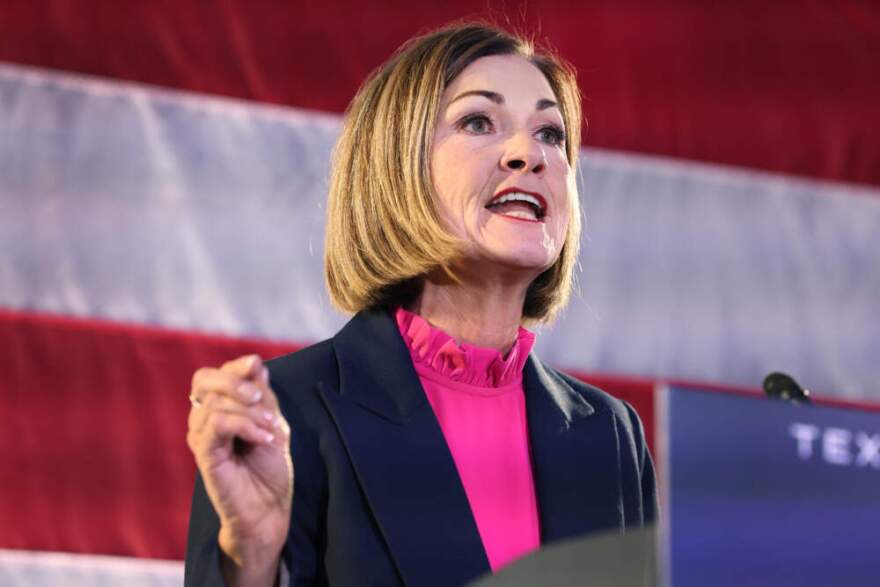
Child care woes are no longer just a concern for parents and providers. Economists are now saying future economic growth hinges on a sustainable child care system.
This is something that Iowa’s Republican Gov. Kim Reynolds says she understands firsthand — it’s why she’s making child care a priority in her state.
Reynolds recently took action on her own after the state legislature did not pass her bill to overhaul the state’s child care system. She expanded a pilot program that allows eligible child care educators to receive subsidies to afford care for their own children. Her administration also established a statewide fund where local businesses can get a tax break for making donations toward boosting wages in the child care workforce and an online dashboard for families to find available child care slots.
“If I want to retain talent and recruit new families to the state of Iowa, some of the things that they look at is quality of life. They look at our schools. They look at access to child care,” she said. “And especially as we’re trying to address workforce issues, that’s a really critical component for us to really look for ways that we could continue to grow our state.”
5 questions with Gov. Kim Reynolds
The state legislature in Iowa did not take up the child care mantle this year in the way that you had hoped, but as governor, you went ahead and took action anyway. Why?
“Well, because it’s really important, and I know it is important. And so we have been looking for creative ways that we could address the issue. And what we’ve really done since 2020 — I mean, it was an outcome of COVID too — is we’ve really worked hard to put a child care system into place that really aligns the strategy with stakeholders, with workforce, with providers, with families and schools.
“It’s really community-focused, and we’ve put unprecedented resources into creating that system. So whether it’s infrastructure or parent support, child care assistance, wages, making sure it’s affordable, looking for ways that we can streamline the process, we’ve really worked hard to build out a system.
“And so we addressed it on different areas that I just laid out. And the last one we really tried to address was 4-year-old preschool and child care. And while we’re fifth in the country for access to child care, we still were only offering 4-year-old preschool half a day. And that wasn’t solving the issue for parents. They needed full-day child care, wraparound systems, that continuum of care. And so that’s the proposal that we put forward. And while we didn’t get it through the legislative session, we were able to stand up the program on a limited basis.”
Democrats criticize some of these moves for saying that you are moving money around from existing programs instead of devoting new funding. How do you respond?
“We did put new funding in it, and that actually didn’t pass. And so I think it was shortsighted on their part. And I fully intend to go back to the legislature and make my case on how we are able to serve more kids, more families, get parents and moms back in the workforce that would like to get back into the workforce but they can’t because they don’t have access to a full-day day care.”
Your children are grown, but how did being a mother factor into how you’re thinking about child care?
“I’ve lived it. I’ve been a working mom my entire life. I dealt with workforce issues as a mother of three. I have three daughters. We have 11 grandchildren. And I’ve watched what they’ve gone through to try to access child care. One lives in the city, in Des Moines, and so she has a little bit better access to child care. The other two are in rural Iowa, and all three of them work, and it’s been an issue for them. And so we wanted to make sure that we were looking at putting a system in place so we could increase access to child care, but not just access to child care, to quality child care.”
Your state has taken some actions that some early childhood advocates would disagree with, around the idea of loosening regulations. In the past few years, Iowa increased the child-to-staff ratios for 2-year-old and 3-year-old children. What was your reasoning there?
“First of all, we were an outlier. So what we did is we looked at that ratio nationally and when it came to the ratio that we had in place in Iowa, we’re right in the middle, where other states are, in order to provide access to child care. But it was part of a larger overall reform, and how we can help bring additional people into the workforce.”
How would you describe your philosophy as a Republican when it comes to child care infrastructure? Have you found points of agreement with Democrats?
“I think when you look at the various investments that we’ve made in child care and the different creative, innovative solutions that we’ve put in place, that really drives the public-private partnership, that is really critical that we’re working with communities across the state, that we’re working with businesses across the state, whether it’s setting up grants for businesses to bring in day care in their facility, or whether it’s working with businesses to put funds towards a child care solutions, funds that helps with wages. I think that those types of systems that we’ve created, I think we’re getting the results that we’re looking for. And so it’s working, and I think that’s the way that we increase access and not only access, but quality of access as well.”
This interview was edited for clarity.
____
Ashley Locke produced and edited this interview for broadcast with Michael Scotto. Allison Hagan adapted it for the web.
This article was originally published on WBUR.org.
Copyright 2025 WBUR

